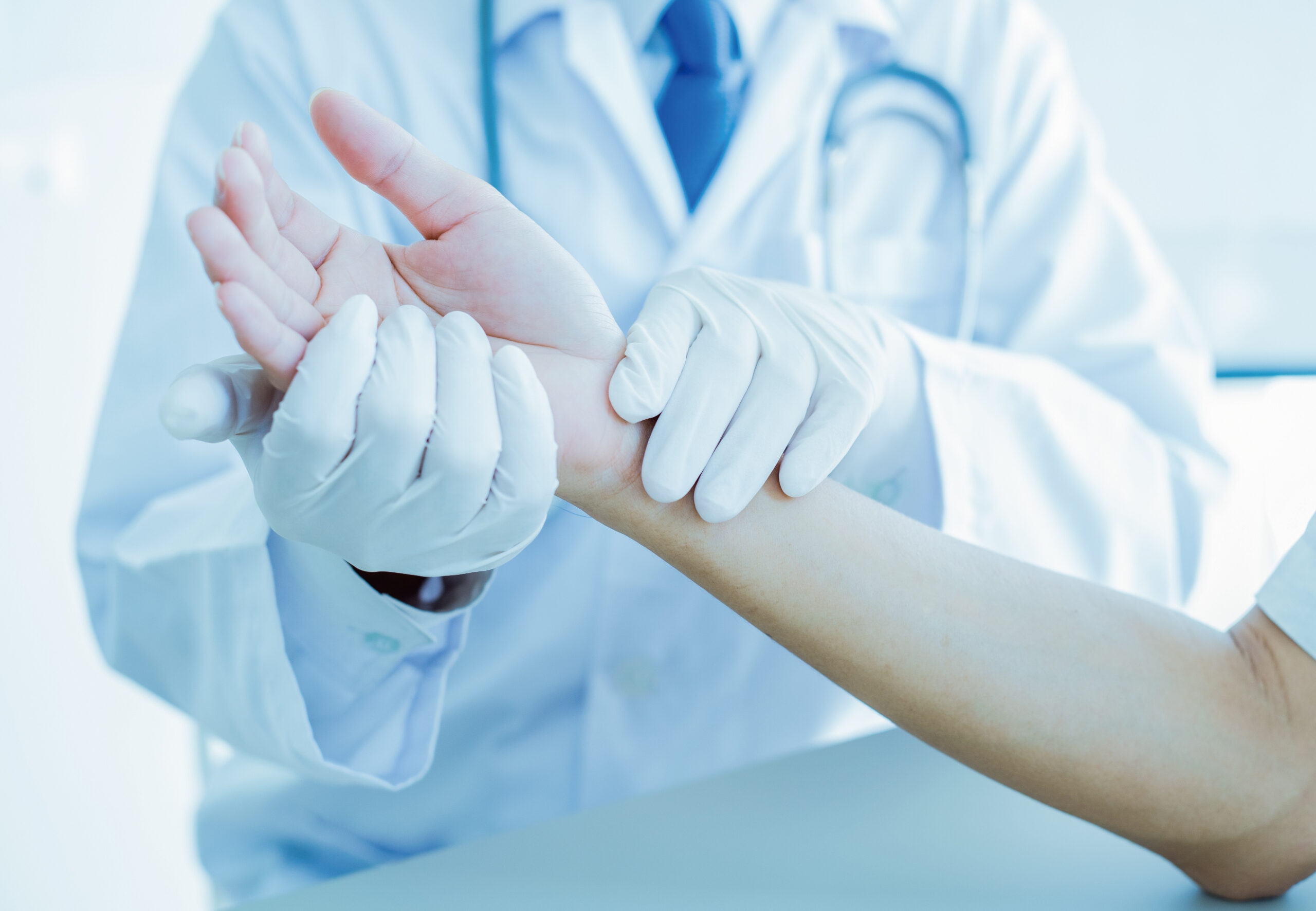
Release date: 2020.09.28
The purpose of wearing gloves by healthcare professionals is to protect them from the risk of infection and contamination through blood, body fluids, injection needles, scalpels, etc., and to reach patients through the hands and fingers of healthcare professionals. And to reduce the risk of contamination of medical facilities and goods.
Gloves can be roughly divided into three types, one for surgery, one for examination / examination, and one for other work, according to the usage in the medical field. Of these, surgical gloves are considered to be "managed medical devices" because they need to be properly managed, such as by sealing them in a sterilized bag, and they need to be certified by a third-party certification body for manufacturing and sales. In addition, some gloves for examinations and examinations are subject to a notification system as one of the "general medical devices", and reuse is prohibited like surgical gloves.
Disposable gloves are available in a variety of materials, and you need to choose the right one for your application. There are four typical materials for gloves used in the medical field: polyvinyl chloride, polyethylene, nitrile, and natural rubber latex.
Polyvinyl chloride, commonly referred to as plastic gloves or vinyl gloves, is used for general hygiene management work. In addition, polyethylene gloves, which are widely used at home, are in relatively low demand in the medical field except for serving food. On the other hand, nitrile, which is a synthetic rubber, has been in great demand in recent years as an alternative to prevent allergies caused by latex gloves. Our group also recommends latex-free type gloves.
The characteristics of each are as shown in the table.
Glove material and general characteristics
| plastic | Rubber | |||
|---|---|---|---|---|
| material | PVC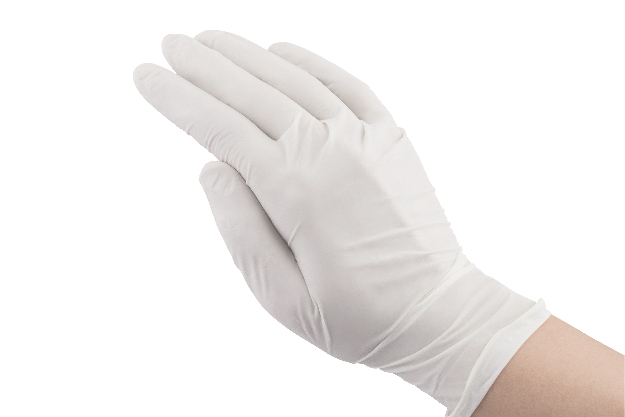 |
polyethylene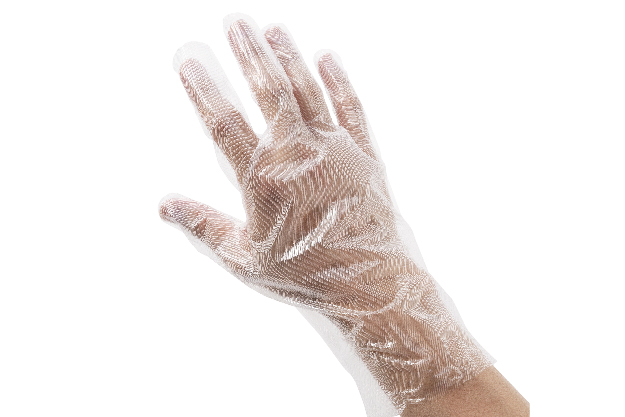 |
Nitrile (synthetic rubber)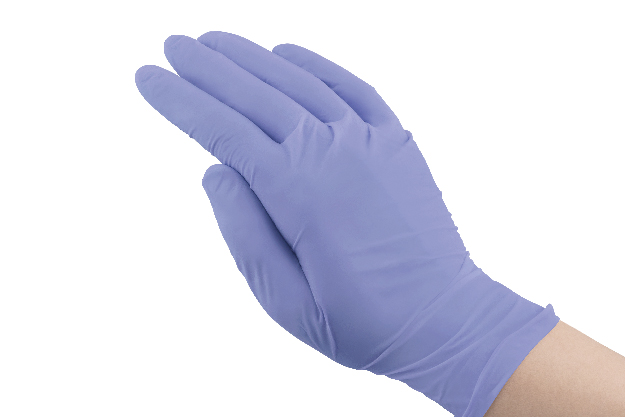 |
Natural rubber latex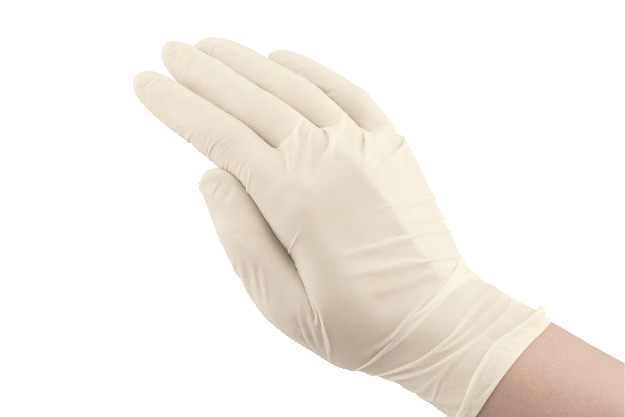 |
| Protective effect | Strong against oils, chemicals and detergents. | Strong against oils, chemicals and detergents. | Strong against oils, chemicals and detergents. | The protective effect on oil and chemicals is low. |
| Strength / durability | Hard to deteriorate. It is vulnerable to damage. | Sensitive to holes and tears. | Durable and suitable for long hours of work. | Durable and suitable for long hours of work. |
| Work performance | It does not interfere with the tactile sensation of the fingers, and fine work is possible. Not applicable to food because it contains phthalic acid. |
Easy to put on and take off without fitting too much to your fingers. | To fit like a bare hand Ideal for detailed work. |
Has excellent elasticity and fits fingers. There is a risk of latex allergy. |
| price | Cheap | Cheapest | Slightly high | Cheap |
| Usage scene | General hygiene management | Cooking, serving, etc. | Surgery, inspection | Surgery, inspection |
* Please also refer to the page on latex allergies.
Some glove products have powder attached to the inside to make it easier to put on and take off. It became clear that the ingredients contained in this powder are harmful to the human body, and the Ministry of Health, Labor and Welfare has recommended powder-free since 2016, and has notified that products using powder should be clearly marked with precautions. ..
Quality assurance is very important for medical gloves, as even the slightest damage can lead to a risk of contamination. In Japan, manufacturing is carried out based on the JIS standard (Japanese Industrial Standards).
Five JIS standards are set according to the application of gloves, and the quality level is determined for the defective product rate and durability such as dimensions, elongation, and pinholes (perforated).
JIS standard for medical gloves
| JIS | Use | Material |
|---|---|---|
| JIS T 9107 | Rubber gloves for disposable surgery | Type 1: Mainly made of natural rubber latex 2 types: Mainly made of nitrile rubber latex, polychloroprene rubber latex, polyisoprene rubber latex, styrene butadiene rubber solution, styrene butadiene rubber emulsion or thermoplastic elastoma |
| JIS T9113 | Disposable dental rubber gloves | Type 1: Natural rubber latex as the main material 2 types: Synthetic rubber latex, natural rubber solution or synthetic rubber solution as the main material |
| JIS T 9114 | Disposable dental vinyl gloves | Main materials are vinyl chloride resin and plasticizer |
| JIS T 9115 | Rubber gloves for disposable inspection / examination | Type 1: Natural rubber latex as the main material 2 types: Synthetic rubber latex, natural rubber solution or synthetic rubber solution as the main material |
| JIS T 9116 | Vinyl gloves for disposable inspection / examination | Main materials are vinyl chloride resin and plasticizer |
On the other hand, there are also standards by the American Society of Testing and Materials International (ASTM), a global standardization body. This stipulates the amount of water-soluble protein eluted, the amount of powder remaining, and the performance after deterioration, and many of the products used in Japan also comply with this standard.
ASTM standard for medical gloves
| ASTM | Use | Material |
|---|---|---|
| D3577 | Surgical rubber gloves | Rubber (natural / synthetic) |
| D3578 | Rubber gloves for inspection | Rubber (natural / synthetic) |
| D6319 | Nitrile gloves for examination | Nitrile |
| D5250 | Medical polyvinyl chloride gloves | Vinyl chloride |
When choosing a product, it is necessary to confirm the applicable application.
Surgical gloves are designed to touch internal tissues and are always sterilized. It is also desirable to double-mount it in case of damage during use. On the other hand, there are both sterilized and non-sterile types of gloves for examination and examination, and it is necessary to use them properly according to the content of examination and treatment. Other versatile gloves are mainly used for cleaning medical equipment and treating contaminants and waste. It is usually not sterilized and cannot be used to touch mucous membranes or wounds.
All types of gloves need to be replaced promptly in case of holes or damage.
MEDIUS Group is developing a business centered on the sale of medical equipment. We (Medical + us) involved in medical care also want to play the role of an information source (Media) that delivers useful information for the medical field and people's healthy tomorrow.